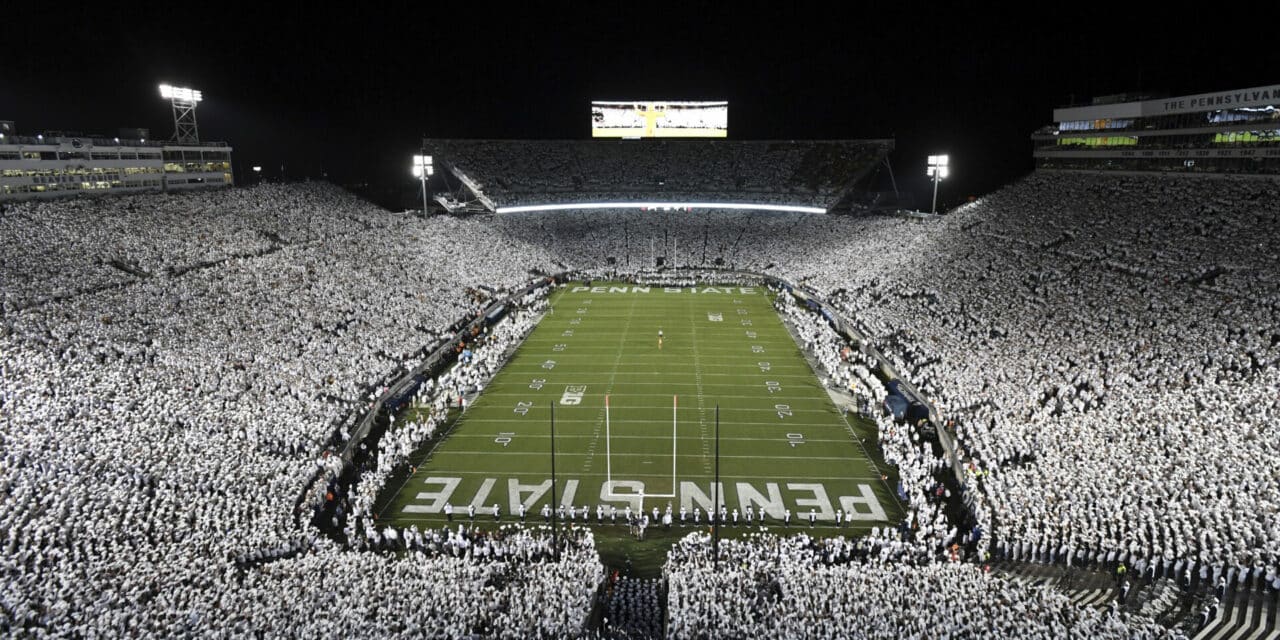WHITE NIGHT: Beaver Stadium, shown during Penn State’s annual “whiteout” game against Minnesota on Oct. 22, 2022, will undergo $500 million on renovations. (AP Photo)
Architect has strong ties to school
Penn State University has selected Populous to design major renovations to Beaver Stadium’s west side, according to sources familiar with the decision.
School officials, including Adam Miller, Penn State’s deputy athletic director for external affairs and engagement, did not return emails for comment. Populous spokesperson Claire Kramer did not return an email for comment.
In a third email, Chris Nations, owner’s representative for the project, would not confirm the selection on June 16, but said he would try to reach Penn State Athletic Director Pat Kraft for comment. As of June 19, there was no response from Kraft.
HKS and HOK were the other two finalists for the project, an investment of $700 million in total, including about $500 million in hard construction costs. All three firms interviewed on June 14. Initially, the proposal was issued to 10 architects.
Populous was considered to be the heavy favorite to win the job, given its strong relationships and past work at Penn State. The firm completed previous renovations to Beaver Stadium, plus the design of $43 million in upgrades to the Lasch Football Building, the Nittany Lions’ practice facility.
Scott Radecic, a senior principal and founder at Populous and a sports architect for 30 years, played football at Penn State before he spent 12 years in the NFL. For the past several years, Radecic has been principally involved in future planning for the school’s sports venues, tied to a 20-year master plan issued in 2017.
The current project is tied to a reconstruction of the west side of Beaver Stadium, college football’s second-biggest venue with 106,572 seats. The redevelopment has been in the works over the past decade. The bulk of the improvements for Beaver Stadium include a large mix of premium seating, new concessions and restrooms and wider concourses.
The total cost extends to an additional $50 million for elements such as fixtures, furnishings and equipment and technology upgrades. All told, the investment stands among the most expensive college football stadium construction projects, along with Northwestern’s $800 million rebuild of Ryan Field over the next few years and Texas A&M’s $485 million renovation of Kyle Field, completed in 2015.
In May, an initial expenditure of $70 million was approved to pay for priority maintenance, winterizing and design services, among other initial costs. Full construction is expected to start in early 2025 with completion for the 2027 college football season.
Penn State, coming off a decisive victory over Utah in the 2023 Rose Bowl, decided to renovate Beaver Stadium over potentially building a new facility at a cost of $1.3 billion to $1.5 billion, sources said.
Populous came up with those numbers after completing studies comparing the cost to construct a new 100,000-plus capacity building with upgrading Beaver Stadium, which opened in 1960.
At that time, the stadium’s capacity was about 46,300. Over the past 63 years, it’s been expanded multiple times, including a 12,000-seat addition completed in 2001.

TUNNEL VISION: Beaver Stadium’s new tunnel club opens this fall as Penn State officials try to generate more revenue apart from college football. (Penn State Athletics)
Penn State hired The Nations Group as its owner’s rep, a role that extends to the consultant helping the school form a plan to finance the project before serving as the conduit between the architects and the general contractor.
Apart from Penn State, The Nations Group is working on college football stadium renovations at Kansas, Air Force and Oregon State. Chris Nations, a former college sports administrator, said in today’s environment, schools must change their mindset to expand stadium programming beyond six to seven football games a year to help justify and pay for the immense investments.
“These projects are becoming more expensive and needed,” Nations said. “Most everyone is in a similar mindset that they’ve got to change because they’re leaving money on the table. Their stadiums are both falling down and not serving their people well.”
To that extent, Penn State recently announced a new tunnel club at Beaver Stadium to open for the 2023 football season. It’s separate from the west side revamp.
Built near the south entrance, the event-level space is tied to a $10,000 annual membership fee, which covers four passes per event, complimentary food and drink, private restrooms and an exclusive WiFi network. The club has views to Penn State players as they exit their locker room and enter the field. It will also be used for special events apart from college football.
Regardless of market conditions tied to financing and construction materials, Nations said it behooves schools to start these capital projects now to sustain football stadiums over the next 30 to 50 years.
“While we go through whatever it is over the next two to four years, it’s still going to be the same outcome,” he said. “If you don’t do something, what it costs you to do something five years from now, has exponentially more cost to it than interest rate risks. I try to get clients to look at it holistically and most of them do, because it’s a feather in their cap, and how they promote their university and themselves.”
Editor’s Note: This story has been updated.







